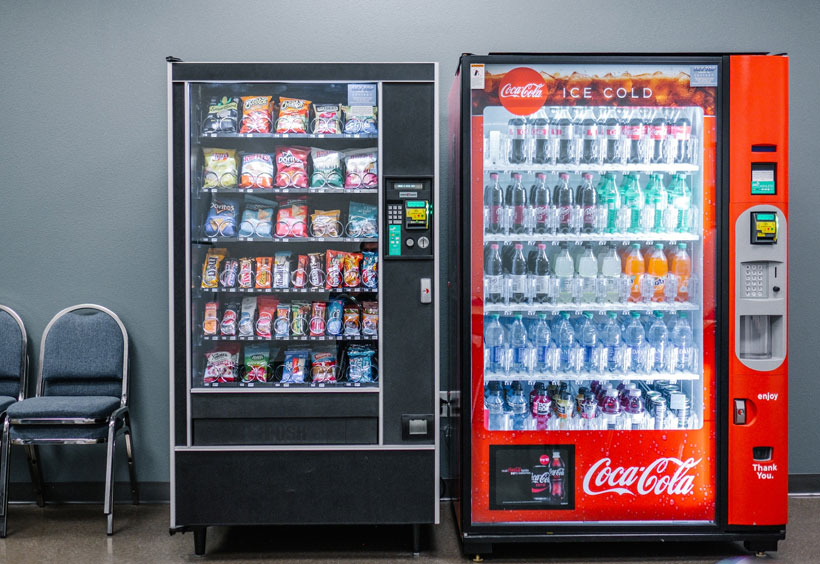How to Start a Vending Machine Business
Sparkpush Editorial Team
Updated January 8, 2024
Edited by: William Crawford

Hello there, aspiring entrepreneur! If you’re wondering how to start a vending machine business, you’ve stumbled upon a venture that expertly blends simplicity with the promise of profitability. When I was younger, my dad’s vending route not only sweetened our afternoons but also demonstrated the tremendous potential of vending machines. Drawing from years of personal experience in this unique industry, I’m here to guide you through the essential steps and considerations for a successful start in your own vending machine business.
Step 1: Market Research and Choosing Your Niche
Jumping into the vending game begins with a crucial step – market research. This is not just about understanding what products to sell but also knowing where they are most likely to fly off the shelves. Vending machines offer a diverse range of possibilities, from classic snacks and drinks to innovative offerings like electronics, eco-friendly items, or even gourmet food.
Your mission is to pinpoint the products that are not just popular but also suit the specific needs of your target locations. High-traffic areas such as shopping malls, office complexes, educational institutions, and transportation hubs are typically hotspots for vending machines. These locations offer a steady stream of potential customers.
In addition, it’s vital to stay abreast of current trends and changing consumer preferences. Health-conscious snacks, environmentally friendly products, or the latest tech gadgets could be your ticket to capturing a niche market. This approach can set you apart from traditional vending machine offerings and attract a specific demographic looking for something more than just a quick snack or drink.
In essence, thorough market research and careful niche selection are the bedrocks of a successful vending machine business. They lay the foundation for what you will offer and where, significantly impacting your business’s potential success.
Step 2: Pros and Cons of Starting a Vending Machine Business
Pros:
- Low Overhead Costs: Vending machines typically require minimal overhead compared to traditional retail spaces. There’s no need for staff, and they can operate 24/7 without additional costs.
- Flexibility: The business offers considerable flexibility in terms of location and schedule. You can stock and maintain your machines on your own time, making it a good fit for entrepreneurs looking for a more balanced lifestyle.
- Scalability: It’s relatively easy to scale a vending machine business. You can start with a few machines and expand as your business grows.
- Diverse Product Offerings: The versatility of vending machines allows you to sell a wide range of products, from snacks and drinks to electronics and novelty items.
Cons:
- Initial Investment: The upfront cost of purchasing vending machines and stocking them with inventory can be significant.
- Maintenance and Vandalism: Regular maintenance is required to keep the machines running smoothly. Additionally, machines can be prone to vandalism or theft, especially in less secure areas.
- Location Dependency: The success of each machine heavily depends on its location. Securing prime spots can be competitive, and poor locations can lead to low sales.
- Regulatory Compliance: Depending on the location and type of products sold, you may need to navigate various regulations and food safety standards.
Starting a vending operation can be a lucrative venture with the right strategy and locations. However, it requires careful planning, initial capital, and ongoing maintenance to ensure long-term success.
Step 3: Budgeting and Financial Planning
Starting out in this industry might seem straightforward, but it’s the numbers game that often decides your success. A well-thought-out financial plan is your roadmap to profitability.
Firstly, calculate the initial investment needed. This includes the cost of purchasing your vending machines – which can vary significantly based on whether they are new or used, and the technology they incorporate. Then, there’s the initial stock of products to fill your machines. Whether it’s snacks, drinks, or niche items, ensure you’re getting a good deal without compromising on quality.
Don’t overlook the additional start-up costs like licensing, permits, and possibly insurance. These can vary depending on your location and the nature of the products you’re vending.
Once you’re up and running, you’ll have ongoing expenses. Restocking your machines will be a regular cost – the frequency and cost will depend on the popularity of your locations. Maintenance is another crucial factor; regular servicing can prevent costly repairs down the line. Additionally, if you’re placing units in high-traffic areas, you might need to pay rental fees to the property owners.
Remember, effective budgeting and financial planning are about striking the right balance between your costs and the pricing of your products to ensure profitability. Keep a close eye on your cash flow and adjust your strategy as needed to keep your operation healthy and growing.
Step 4: Buying Your Vending Machines
The heart of your vending machine business lies in the machines themselves, and choosing the right ones is a pivotal decision. The market offers a spectrum of options, from shiny, new high-tech machines with touch screens and card readers to more budget-friendly, refurbished models.
When deciding between new and used choices, weigh the pros and cons. New units are less likely to need repairs and may offer advanced features like cashless payment options, which can attract a tech-savvy customer base. However, they come with a heftier price tag. Used snack machines can be more cost-effective and are a practical choice when starting out, but they might require more maintenance.
The type of machine you choose should align with your product selection. Traditional machines are ideal for snacks and drinks – staples in high-traffic areas like offices and schools. Bulk vending machines, like those dispensing gumballs or small toys, are excellent for locations with families and children. If you’ve set your sights on niche markets, specialized machines can dispense anything from hot beverages to electronic gadgets.
Remember, each of these self-service kiosks is an investment in your company’s future. Consider factors like durability, maintenance needs, and the potential to upgrade features. Making the right choice in machines will lay a solid foundation for your startup.
Step 5: Securing Prime Locations
The saying “location, location, location” holds particularly true in the vending biz. The success of your equipment hinges heavily on where they are placed. This step is all about scouting and securing those prime spots that will ensure your machines are not just seen but used frequently.
Begin by identifying high-traffic areas where your target customers frequent. These could be shopping malls, busy office buildings, universities, hospitals, or transport hubs. Once you’ve pinpointed potential locations, it’s time to negotiate with the property owners or managers.
Be prepared to discuss the terms of placement. This could involve paying a fixed rental fee, a percentage of your sales, or possibly a combination of both. Ensure that these terms are favorable enough to make your venture profitable.
Also, focus on the accessibility, safety, and visibility of your machines. They should be easy for customers to use, safe from vandalism or theft, and placed in well-lit, high-traffic areas. Consider the power supply and any other logistical requirements your machines may have.
Securing the right locations is a critical step that can make or break your operation. Take the time to choose wisely and negotiate terms that benefit both you and the location owners.
Step 6: Stocking and Managing Inventory
In the vending business, your inventory is your lifeline. It’s crucial to stock your machines with items that not only align with your market research but also meet the ever-changing preferences of your customers. The key to success here is adaptability and smart inventory management.
Start by choosing a range of products that are most likely to appeal to the demographic frequenting your machine locations. If you’re in a gym or a health center, for instance, healthier snacks and drinks might be more popular. On the other hand, machines in office buildings might do better with a mix of snacks, both healthy and indulgent.
Tracking sales is essential to understand which items are hot sellers and which are not moving. This data helps you make informed decisions about what to restock and what to replace. Embracing technology can simplify this process. Many modern product dispensers come equipped with inventory management systems that allow you to monitor sales and stock levels remotely in real-time.
Effective inventory management also involves timely restocking to ensure your machines never run empty, and regular reviews to adjust your product offerings based on sales trends, seasonality, and customer feedback. Keeping your inventory aligned with customer preferences will ensure your vending machines remain a go-to source for their needs.
Step 7: Obtaining Licenses and Permits
A critical, yet often overlooked, aspect of starting a vending machine business is ensuring you’re on the right side of the law. Navigating the legal landscape involves obtaining the necessary licenses and permits, which can vary significantly depending on your geographic location.
Begin by researching local regulations. Your city or county may require a general business license, as well as additional permits specific to vending operations. These regulations often vary not just by state but can differ from one municipality to another.
Next, look into state requirements. Some states may have specific vending machine operator licenses, particularly if your units will dispense food or beverages. These might come with health and safety inspections to ensure compliance with food safety standards.
Don’t forget about federal regulations, especially if your kiosks will be placed on federal property or if you plan to operate across state lines.
In some cases, you might also need to comply with the Americans with Disabilities Act (ADA) requirements, ensuring your machines are accessible to all customers.
Ensuring you have all the necessary permits and licenses before you start operating not only keeps you legally compliant but also builds credibility and trustworthiness in your business dealings. Take the time to understand and fulfill these legal requirements to lay a solid foundation for your operation.
Step 8: Marketing Your Business
In the vending machine business, don’t underestimate the power of effective marketing. Even in a seemingly straightforward industry like this, a strategic marketing approach can significantly enhance your visibility and profitability.
Start by branding your equipment. This doesn’t mean just slapping on a logo; think about the overall aesthetic and what it communicates about your brand. Is it fun and quirky, sleek and modern, or health-focused? Your machines are mobile billboards – use them to make a lasting impression.
Next, consider running promotions to draw in customers. This could be anything from discount codes, bundled deals, or loyalty programs for frequent users. Promotions are a great way to generate buzz and encourage repeat business.
Community engagement can also be a powerful marketing tool. Get involved in local events or sponsor community activities. This not only increases your brand visibility but also helps to establish your business as a valuable part of the local community.
Lastly, don’t overlook the potential of social media. Platforms like Instagram and Facebook can be used to announce new machine locations, featured products, and special offers. Engaging content can help build a community of followers and turn casual customers into loyal fans.
In summary, a well-thought-out marketing strategy can give your vending machine business the extra push it needs to stand out in a crowded market.
Step 9: Maintenance and Customer Service
A crucial but sometimes overlooked aspect of running a vending machine business is the regular maintenance and upkeep of your machines. Well-maintained machines are essential not just for their functionality but also for presenting a professional image to your customers.
Regular maintenance includes routine cleaning, ensuring the machines are fully operational, and promptly addressing any mechanical issues such as coin jams or malfunctioning dispensers. This preventive approach can save you from larger, more costly repairs down the line and helps to avoid downtime, which can directly impact your revenue.
Equally important is customer service. In a business where your interaction with customers is mostly indirect, the way you handle service issues can make a big difference. Be prompt and efficient in addressing any complaints or refunds. If a machine malfunctions, ensure you have a clear, accessible way for customers to report the issue and request assistance.
Consider implementing a system for customers to easily provide feedback on their experience. This could be as simple as a QR code on the machine linking to a feedback form. Listening to your customers and acting on their feedback not only enhances customer satisfaction but can also provide valuable insights into how to improve your service.
Remember, in the vending machine business, regular maintenance and excellent customer service are key to ensuring happy, repeat clientele.
The Best States for Your Vending Machine Business
- California: High population density and numerous high-traffic locations.
- New York: Busy urban centers and a significant number of tourist attractions.
- Texas: Growing population and diverse economic environments.
- Florida: High tourist footfall and year-round warm weather.
- Illinois: Including Chicago, with its dense urban landscape.
- Pennsylvania: Urban areas combined with numerous colleges and universities.
- Ohio: Multiple large metropolitan areas with busy public spaces.
- Georgia: Atlanta and other cities provide lucrative vending opportunities.
- North Carolina: A growing economy and expanding urban areas.
- Michigan: Urban centers and numerous educational institutions.
These states typically offer a combination of high foot traffic, favorable business climates, and diverse demographic, making them potentially lucrative for vending businesses. However, it’s important to conduct thorough market research and understand local regulations in any state you consider.
The Bottom Line
Starting a vending machine business can be a fantastic venture for an enterprising individual. It requires a blend of strategic planning, financial savvy, and operational efficiency. Keep customer satisfaction at the core of your business, stay adaptable, and you might just find this venture a rewarding and profitable journey. Good luck, and may your machines never run out of change!









